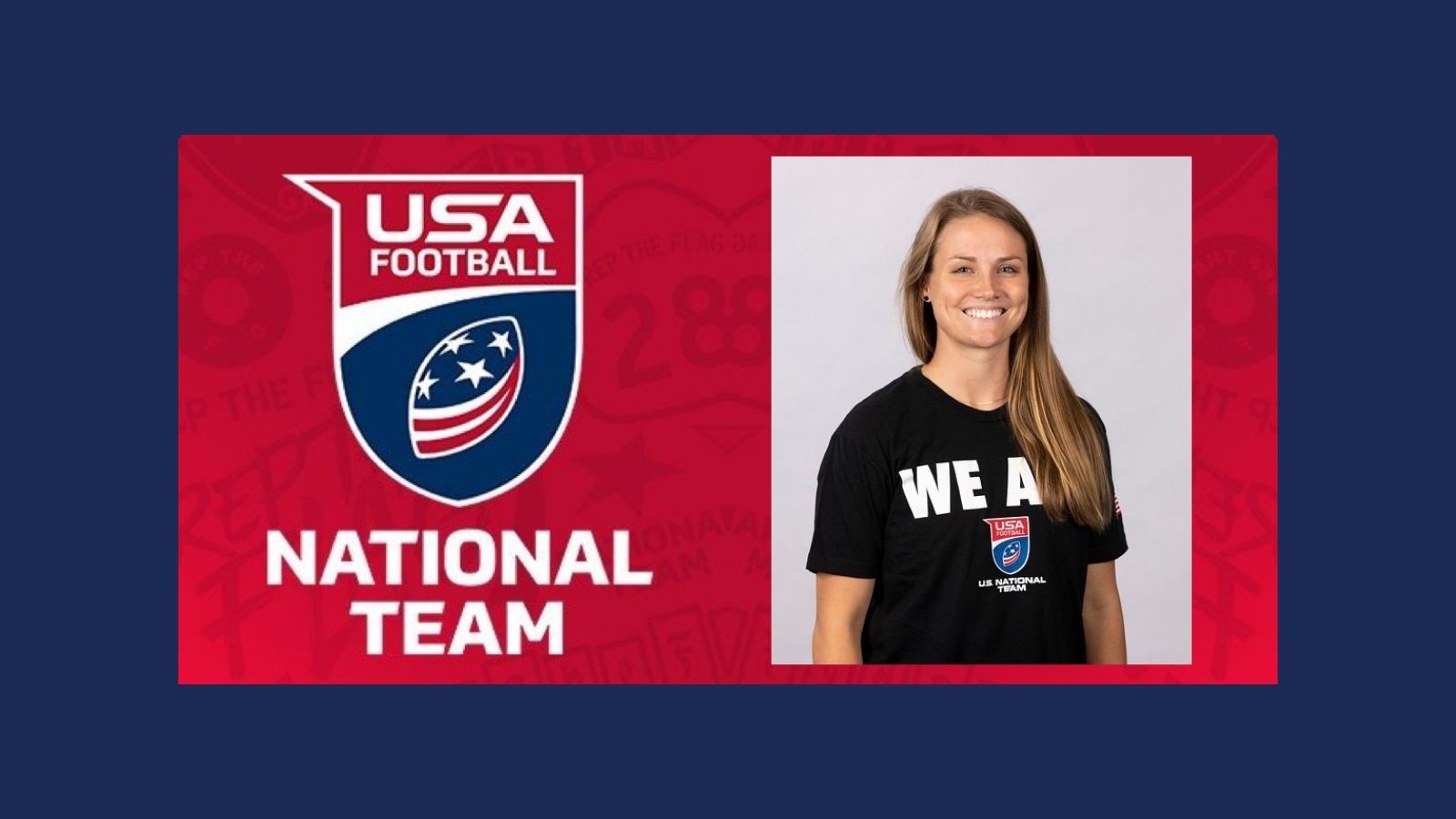Mary-Kate Bula, recruiter on Green Key’s Pharma team, was recently selected as Assistant Coach of the USA Women’s Flag Football National team. This decision comes at a pivotal moment for women’s football as the sport continues to gain momentum and recognition on a national scale. With her extensive experience as a player, she brings a wealth of knowledge and expertise to her new role. Her dedication as a recruiter and to the game has proven her leadership skills will make her an invaluable addition to the coaching staff.
According to USA Football, “Bula, a native of Rockville, Md. who currently resides in Charlotte, N.C., was a defensive back with the U.S. Women’s Flag National Team in 2021 and 2022. She was a member of the team that defeated Mexico 31-21 in Jerusalem, Israel at the 2021 IFAF Flag World Championship. The following year, Bula and the U.S. won silver medals at The World Games 2022 in Birmingham, Ala. Prior to her international playing career, Bula won three National Intramural-Recreational Sports Association (NIRSA) Regional Flag Football Championships during her time at Towson University.”
We had the opportunity to chat with Mary-Kate about her new role and how she plans to excel as Assistant Coach.
What inspired you to start playing football?
I started playing when I was in second or third grade. So, I don’t know if I necessarily had an inspiration. It was kind of something in my family, we are big football fans, and everyone played, including my brother when he was younger, and I always wanted to do what he did. It was also just an opportunity to play something different, something not all the girls played. I’ve also always liked those kinds of rough and tough sports, which is why I got into football so young. Football has always been the sport I enjoyed the most but there weren’t a lot of opportunities for younger players as you do with most sports. So, I played when I was little and then picked it back up as an adult.
How do you feel about your new role?
You know honestly, I don’t know that I have the words to describe it, to be quite honest. I’m still almost like in a little bit of a shell shock that I got the position because while this has always been my goal, I didn’t expect it so soon. I just finished being a part of that team as a player last year. So, there’s really no words other than, I’m super excited and I’m ready to make an impact on the game in a different way than as a player. I’m just super excited.
What aspects of football coaching are you most excited about?
For me, I think the game of flag football is developing rapidly and I have that experience as a player. So, I think what I’m most excited about is to be able to relate to the current team and give them the knowledge and advice that I wanted as a player. I think I have a different perspective now than most of the coaches have had in the past. So, just being able to shed light on what it’s like to, you know, have the pressure of a player and be able to coach them through that more than anything is what I’m excited to focus on.
Are there any specific coaching philosophies or strategies you plan to implement?
This is a great question, and I’ve thought about this one a good amount. I’m not sure that I have a philosophy necessarily because again flag football is developing so much that I think that my philosophies are going to change a lot and strategies are going to change a lot as the game continues to evolve. I think just an overall philosophy I have as a coach and as a player is putting your ego aside and understanding that this is bigger than us, especially at this moment because football is on the path to being in the Olympics in 2028. We already did get brought in to the Olympics, so right now is a huge turning point in this program and in the sport in general. I really want to help the players understand that this is bigger than us and there is no I in team right now of course, but even more so right now as we’re looking forward to having that goal of being in the Olympics and competing and winning gold.
What challenges do you anticipate facing in this role and how do you plan to overcome them?
I think the first thing is learning how to kind of set boundaries with the players and understanding that, even though I’ve played with some of the players, I will be coaching now. So, number one, setting boundaries that, I am now a coach now and being transparent about both of our boundaries and just earning that kind of respect. I think just reminding the players that our titles are now a little bit different, but we still have the same goal. Other than that, I feel like I’ve always been a kind of a leader, and now I’m officially transitioning to the coach role I don’t see it being super difficult. I think it’s more of just having the players see me as a coach now, is my biggest kind of worry and one of those things I’m going to have to consciously think about overcoming.
What advice would you give to other women aspiring to pursue coaching roles?
I would always say go for it. I think right now you see so many coaches that are women like Callie Brownson and Jennifer King and the fact that they’re doing in the NFL is absolutely insane and amazing. So, there are multiple women that you can look up to you as a young girl and say I can be like them. I’m trying to do that same thing in the flag world, especially because it’s a women’s sport. We probably won’t ever have NFL level tackles but flag football, especially in the women’s space, is huge. So, all I want is to show that, you know, let’s be the trailblazers to hopefully make this a woman dominated field or sport and just to set your sights on not only being a player, but if you want to have that goal as a coach to just to work towards that as well.
How do you envision balancing your responsibilities as an assistant coach while working full-time at Green Key?
One of the first things I did when I got the position was talk to my manager about it and they knew that while I was on the team it would be the same kind of thing where I’d be traveling a lot and having very busy weekends. So, you know, I was able to do it as a player and stay on top of everything, while training constantly to stay in shape. So, I’ve done it before. I think doing it again just from a different perspective is not going to be too difficult, but I have to say I’m so thankful for my managers here at Green Key that they’ve given me all their support. And know that I’m pretty good at understanding that my day-to-day is different than my night because my night is going to be spent working on football stuff. It’s a little bit of a balancing act, but I’ve done it before and I’m ready to do it again.


